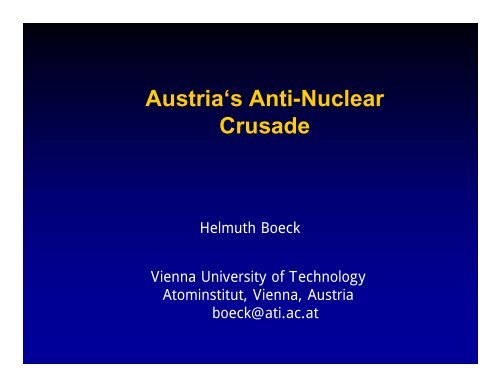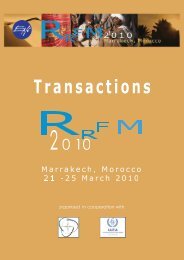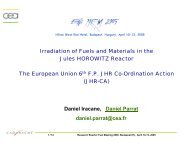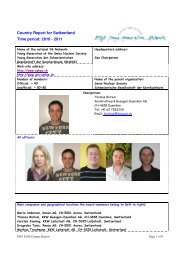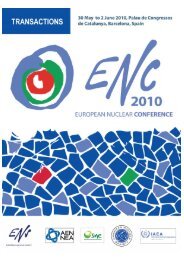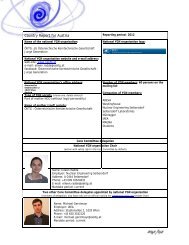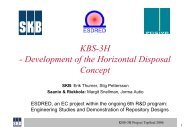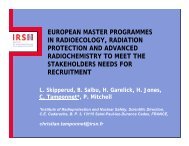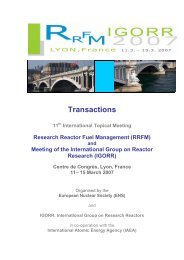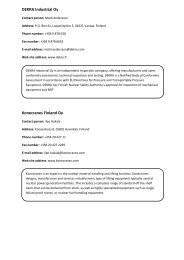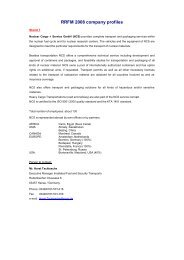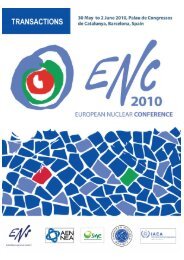Austria's Anti-Nuclear Crusade - European Nuclear Society
Austria's Anti-Nuclear Crusade - European Nuclear Society
Austria's Anti-Nuclear Crusade - European Nuclear Society
Create successful ePaper yourself
Turn your PDF publications into a flip-book with our unique Google optimized e-Paper software.
Austria‘s <strong>Anti</strong>-<strong>Nuclear</strong><strong>Crusade</strong>Helmuth BoeckVienna University of TechnologyAtominstitut, Vienna, Austriaboeck@ati.ac.at
Seibersdorf 10 MW MTR Reactor• Initial criticality24.9.1960• Final shut down31.7.1999• Under decommissioningsince• Ultimate aim: : Toconserve the reactor hallfor waste storage
TRIGA Mark IIReactor• Initial criticality7.3.1962• In operation five daysa week, , 45 weeks peryear for education andtraining• Scheduled to operateuntil 2016
Graz Argonaut Reactor• Initial criticality17.5.1965Final shutdown 31.7.2004• Fuel to be returnedto USA by end of2005• Decommissioned2006
The period 1968 to 1978• 1968 „Kernkraftwerksplanungsgesellschaft KKWP“founded• 1970 „Gemeinschaftskernkraftwerk Tullnerfeld GmbHGKT“ founded• 1972 construction permit issued and work at NPP startedimmediately• Early 1970-ies:world wide anti-nuclearnuclear movement alsoin Austria, public discussion on safety and need ofnuclear energy in Austria
NPP Zwentendorf• 730 MW e BoilingWater Reactor(BWR Designmodel 69) builtby KWU(originallyAEG)
The Kreisky Referendum• 1978 Chancellor Kreisky (Social(Democratic Party SPÖ, , pro nuclar) decidedpublic referendum on the future of nuclear power in Austria• Strong political aspect brought into technical discussion• NPP originally proposed by Christian Democratic Party (ÖVP)(• Kreisky promised to resign if referendum outcome is negative• ÖVPsaw chance to get rid of Kreisky, therefore many pro-nuclearÖVPparty members voted anti-nuclearnuclear• Referendum on November 5th 1978– 31,6% against the NPP,– 31,0% for NPP,– 35,9% did not participate,– 1,5% invalidin summery difference of 30 000 votes with 5 million allowed voters• December 1st 1978 Parliament issued a law which forbids „theuse ofnuclear fission for energy production Austria“ , the law can only be changedby a 2/3 majority and Kreisky did NOT resign
Start of the anti-nuclearnuclear movement1978 to 1990• The NPP was placed in a conservation state for a possible laterrestart• 1979 Three Mile Island accident• 1986 Chernobyl accident• Final blow to the NPP, some components sold but the majorcomponents are still in a kind of „Historical<strong>Nuclear</strong> Monument“• 1978 Reactor Safety Commission (RSC) to conserve nuclearknowledge established, composed of national and internationalexperts• 1990 Eastern Europe disintegrated• Austrian Government realized NPP´s s of Soviet design in operationor planning near the Austrian border• RSC dissolved under dubious legal aspects by Chancellor Vranitzky• Replaced by group called „Forum für f r Atomfragen FAF“ mainlycomposed of persons with well known anti-nuclearnuclear background
1990 to 1999 Mochovce Fight• FAF supported Austrian government with technical expertise in it´santi-nuclearnuclear strategy towards neighbour countries• First test case: Two Slovak WWER 440/213 in Mochovce• Slovak Republic (SR) supplied all requested documents to FAF• Final FAF report states that NPP Mochovce– is basically unsafe,– does not fulfil international safety standards and– poses a high risk to Austria• SR tried to obtain EBRD credit to finance the NPP completion• Austria successfully blocked allocation of the credit• Austria appealed to the EU Commission and EU Parliament• Austrian politicians engaged as quasi-religiousmissionaries for a„<strong>Nuclear</strong>Free Central Europe“• Supported by an almost paranoid attitude of Austria´s media againstany nuclear issue
• May 22, 1998 anti-nuclearnuclear activists occupied the SlovakEmbassy• FAF warned of a „Super GAU in Mochovce“• Chancellor Klima warned SR that Mochovce case could play animportant role in the Austrian´s support for the Slovak EUaccession• June 9th 1998 one major Austrian newspaper announced„Thelethal reactor is switched on, danger is growing from dayto day“• During start-uptests of the NPP test shut downs werepresented by Austrian newspapers using titles as „Thelethalreactor is already defect during start-upup“• December 2, 1999 one major newspaper headline says „Infront of the rubble of Austria´s anti-nuclearnuclear policy“.• 2nd NPP unit was made critical on December 1st 1999without any major protest
Since 1994: Temelin Fight• Since 1978 Czechoslovakia planned 4x1000 MWe reactors atthe site of Temelin• Project on hold until early 90-ies• Strong opposition in Austria under Chancellor Vranitzky• Since the mid 90-iesAustria tried to make Temelin a<strong>European</strong> problem• It also linked Temelin with imminent EU accession of CzechRepublic (CR) warned to veto the energy negotiations• In same period major political changes in Austria: FormerSocial Democratic (SPÖ) government replaced by coalitiongovernment with Christian Democrats (ÖVP) and right wingFreedom Party (FPÖ)• EU sanctions against Austria lasting over a year• CR supplied all requested NPP documents to FAF
• Austria required from Czechs German safety standards forTemelin• Temelin was first NPP placing work progress in Internet• Strongly abused by Austrian media and anti-nuclearnuclear groups,every minor problem was a major nuclear accident• In 2000 many high level bilateral political and technicalnegotiations with no visible results• EU was requested as mediator, several meetings in theAustrian town of Melk and in Brussels• Frequent road and border blocks in Austria by anti-nuclearnucleargroups• Overall anti-nuclearnuclear phobia created by media• Finally EU Commissionor for EU enlargement G. Verheugenbrought parties together to find way out of dead end
• After many meetings on December 12, 2000 the Melk Protocolsigned which included1. Extended Environmental Impact Assessment (EIA)2. Early and direct information system between the two countries3. Austrian monitoring station near the NPP Temelin4. Close cooperation on energy research5. No road or border blocks6. Both countries agreed to support EU enlargementFull text in• www.umweltbundesamt.at/umweltschutz/kernenergie/akw/temelin/etemelk/
• Melk Protocol critizised by anti-nuclearnuclear groups• In 2001 many high level meetings up to Prime Ministers• Austrian list containing 29 technical deficiencies reduced tothree major concerns– Safety of blow down valves in primary circuit– Wipe effect of pipes near containment penetration at +28.8 m– Capacity of emergency batteries• Temelin issue reduced to legal issue how to produce abilateral binding contract on open safety issues• November 29, 2001 trilateral agreement (BrusselsProtocol)was signed, full text in• www.umweltbundesamt.at/fileadmin/site/umweltthemen/kernenergie/temelin/Roadmap/Br_ssel/bruessel_eng.pdf
• Results heavily critizised by SPÖ, , FPÖ and Green Party• Austrian internal politics completely blocked in 2001 by theTemelin case• FPÖ organised referendum in January 2002, signed by lessthan one million citizens (=15.5% of voters)• Austrian coalition government almost broke up• Provincial government of Upper Austria brought suit aganistCEZ in an Austrian court• Rejected as Austrian court has no rule over a sovereigncountry• General problem: „Sovereignity“ and relationship between EUMember States and Canditate Countries• Chancellor Schüssel (A) and Prime Minister Spidla (CZ) agreedto attach Melk Protocol to the Czech Accession Treaty, but itremains a bilateral agreement
Final Remarks• Technical matters completely covered by political aspectsin a multi-layerslayers process– Austria‘s internal political problems– Austria‘s bilateral problems with Czech Republic– Austria‘s problem with EU– Czech acession to the EU• Temelin – heavy strain on bilateral agreements• Temelin almost broke Austrian coalition government• Complicated technical matters cannot be discussed inmedia and should not be used for internal politicalambitions• Both parties must agree on positive attitude and keepemotions away from negotiations


